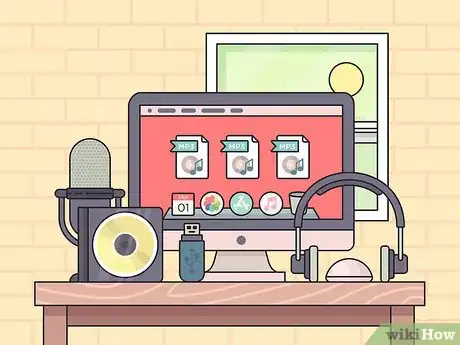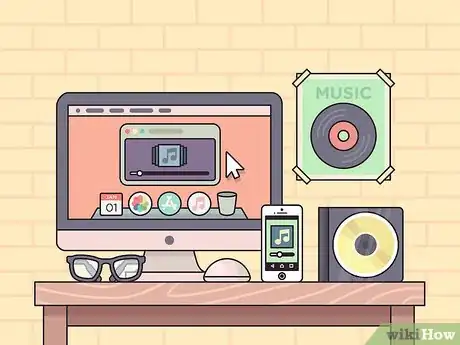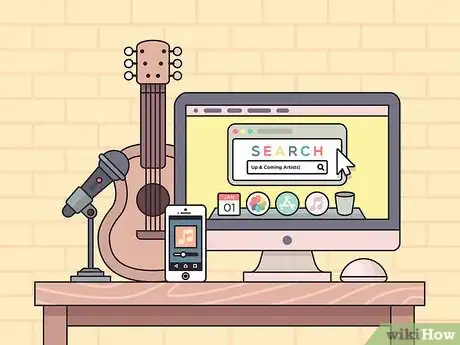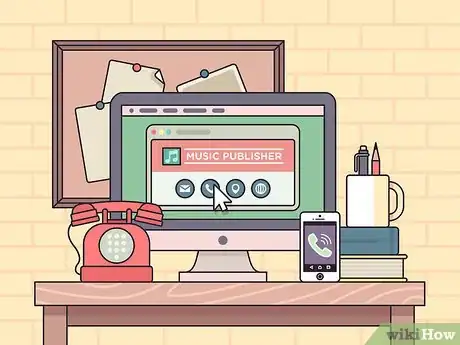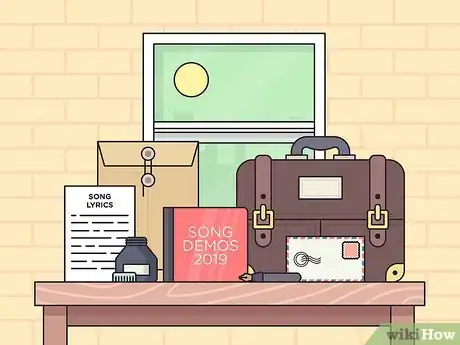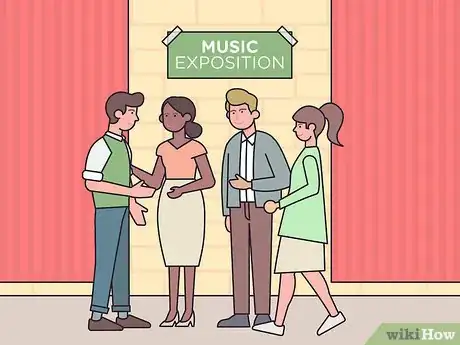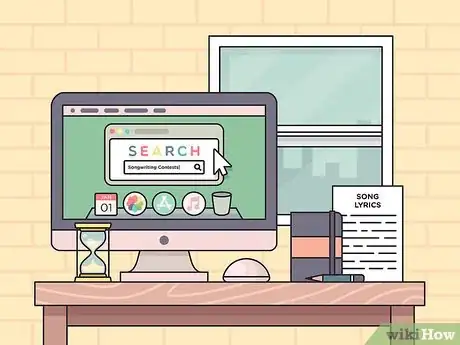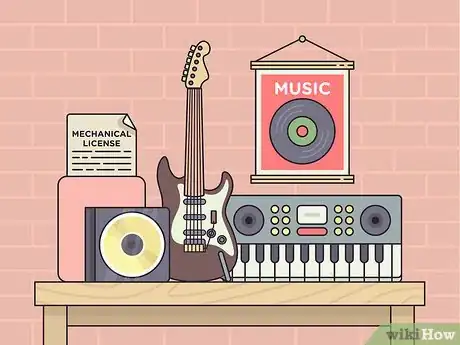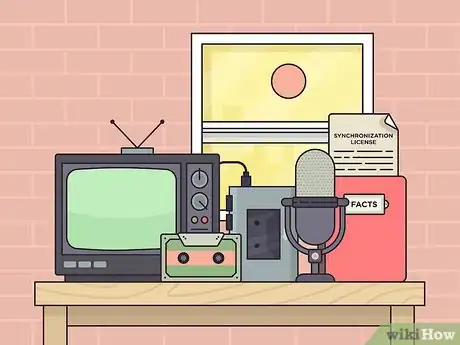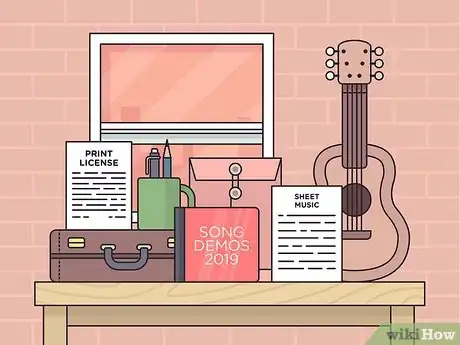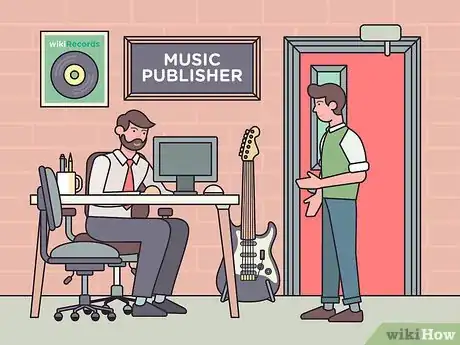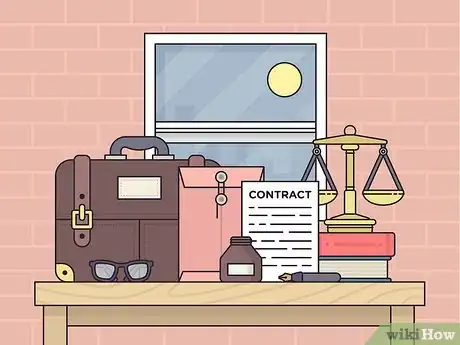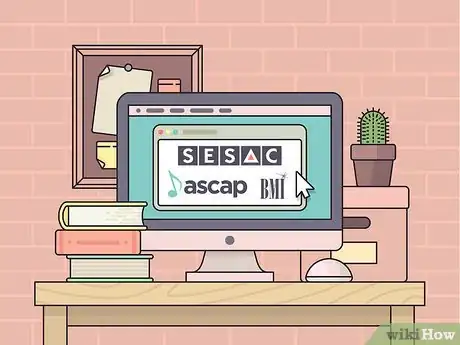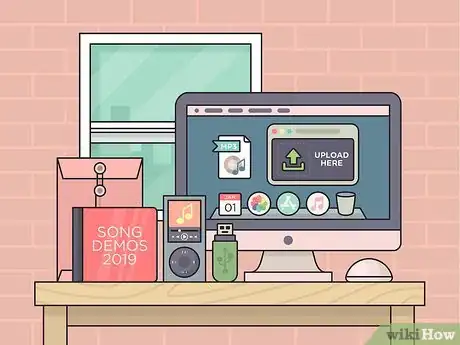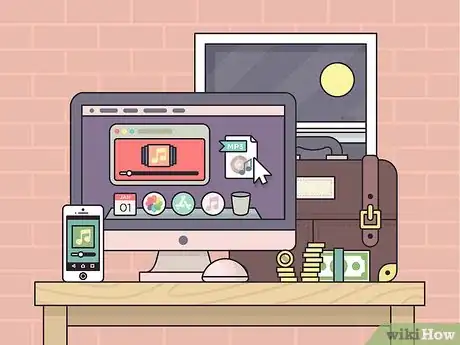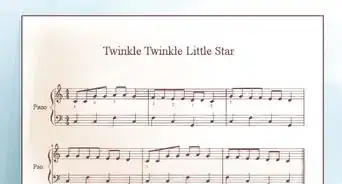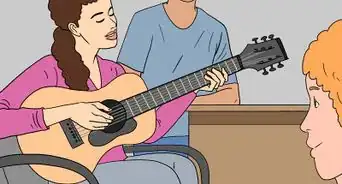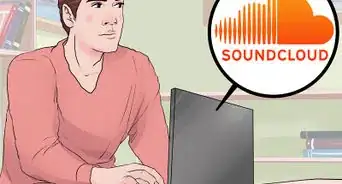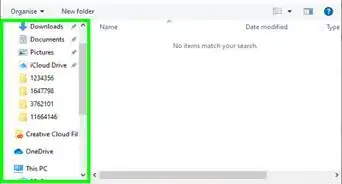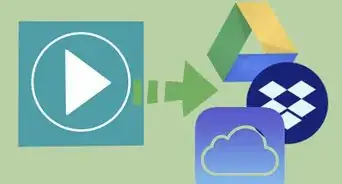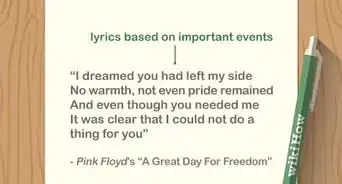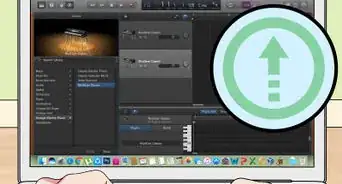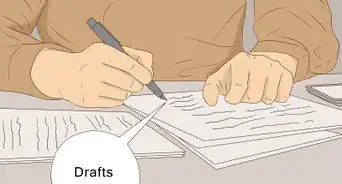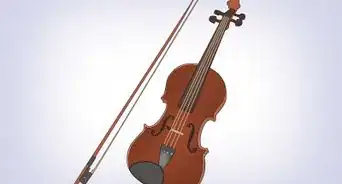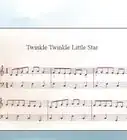This article was co-authored by wikiHow Staff. Our trained team of editors and researchers validate articles for accuracy and comprehensiveness. wikiHow's Content Management Team carefully monitors the work from our editorial staff to ensure that each article is backed by trusted research and meets our high quality standards.
There are 12 references cited in this article, which can be found at the bottom of the page.
This article has been viewed 31,909 times.
Learn more...
You've written a great song that you believe is the next big hit. What comes next? Don't sell the lyrics to your song outright. Instead, work with artists, publishing companies, and performing rights organizations to come up with a licensing agreement. A licensing agreement gives an artist the right to record and perform your song, and you collect royalties. The music industry can be difficult to navigate, but if you have truly great material and some patience, you can make money from your lyrics!
Steps
Pitching Yourself as a Lyricist
-
1Record a demo of your song. If you only write lyrics, get some help from a composer to set your words to music. Then, make a recording of the song. Once you have a demo, you can begin marketing yourself.[1]
- You don't need a perfect recording, but it should be professional. The more polished your sample is, the more likely it is to get passed on to an artist or agent.
- To record at home, use a high quality microphone attached to your computer. Record any instruments first, then vocals. Use recording software (free or paid) to put the instruments and vocals together. Clean up the sound by adjusting the volume so that it is consistent across the whole track and aligning any inconsistencies in rhythm.
-
2Make sure your song fits with an artist's sound. Before pitching a song to an artist, be able to picture that artist singing the song. It should fit in with their style and sound. For example, if you are interested in working with an artist with a retro sound, don't pitch them a song that you see as a club hit.[2]
- Making sure a song fits with the artist's style is more important than trying to pitch an artist a song you think will be a hit.
- Find up-and-coming artists by attending music festivals, conferences and expos, or by looking into publishers who work with new artists. Listen to the artist's work as much as you can to make sure your song fits with their sound.
Advertisement -
3Look for up and coming artists to work with. The chances that your pitch will be heard by an established music star are very low. Even new artists that aren't huge names yet can receive hundreds of pitches. Increase your chances by looking for smaller artists to work with.[3]
- Contact artists through their manager or agent, if possible. Their contact information is usually easier to find, and they can help pitch you to the artist.
- For new artists, you can also try contacting them directly through email or social media. This approach works best for independent artists who don't have a record label.
-
4Contact music publishers before sending your demo. Big-name artists work with music publishers, not directly with songwriters. If you want to work with a big artist, look up what music publisher they work with. Get permission from that publisher by contacting them through email or a phone call, and then send your demo. [4]
- When deciding on whether or not to work with a publisher, ask what artists they see performing your work and how they would get that artist to hear it.
-
5Send 1-2 polished, complete songs to a publisher or artist. To increase your chances of being heard, send a CD with a song or two that is a strong fit for the artist. Never send more than 5 songs. Make your demo CD look professional with a printed label and case.[5]
- Be patient and don't bother the person you sent your demo to. They will contact you if they like the song.
- If you send an MP3, embed your contact information in the file.
-
6Build relationships in the industry organically. Attend events like music expositions, conferences, and conventions and introduce yourself to different publishers. Hand out business cards and politely follow up.[6]
- Once a publisher knows you, you are much more likely to be able to get a meeting with them.
-
7Look for lyric writing competitions to try your luck at getting discovered. If you want to skip all the networking and meetings and know you have great lyrics on your hands, try a contest. Winnings usually include the chance to work with music industry professionals and cash prizes.[7]
- Even if you don't win a prize, you could get noticed.
Licensing Your Song
-
1Opt for a mechanical license if you only want to allow the song to be recorded. There are 3 basic kinds of licenses you can use to allow the publisher to do different things with your song. A mechanical license allows the artist to record your song.[8]
- You can designate yourself as a publisher to give yourself license to record your song.
-
2Choose a synchronization license to allow your song to be played on TV. In order to allow the right to use your song in a movie or TV show, you'll need a synchronization license. You can collect royalties, split with the publisher, based on agreements with the TV or film producers.a[9]
- An established publisher will handle synchronization licenses and pitch the song for TV and film products.
-
3Go for a print license to allow copies of the sheet music or lyrics to be printed. A print license allows the artist to distribute copies of the lyrics or sheet music. This is useful if the artist would like to include lyrics with CDs or digital albums.[10]
-
4Work with a publisher to navigate licensing your music. Find publishers at songwriting workshops or conferences. Also look for a publishing company you see yourself having a good relationship with. Once you have a publisher, they will navigate contracts with artists.[11]
- It can be difficult to get an agreement with a publishing company. You can also set up your own publishing company to represent yourself. Keep in mind that you'll need to make your own connections to agents and artists to be successful as your own publishing company.
-
5Review all contracts, edits, and proofs yourself. Your publisher may send you edits for your song. Once you both have a finalized version, review any proofs the publisher sends you before approving them. Finally, you should read the contract the publishing agent sends you before signing it.[12]
- Always keep copies of your contracts.
-
6Join a Performing Rights Organization (PRO) by registering online. Once you have an agreement with a publisher, join a PRO to be able to collect royalties. Anyone can join by providing basic contact information and a social security number, for tax purposes. You will also sign a contract specifying the terms of your membership. Contracts usually last around 2 years and are renewable. Sometimes, you will also need to pay a membership fee.[13]
- Some well-known PROs include BMI (Broadcast Music, Inc.), ASCAP (American Society of Composers, Authors, and Publishers), and SESAC (Society of European Stage Authors and Composers).
-
7Register your song with your PRO online. With most PROs, you will be able to log into an account and register your song. You may need to include a lead sheet (the musical notation of your song), a copy of the recording, and a copy of any agreements you may have with a publisher or co-writers.[14]
- You will receive a unique registration number for each song.
-
8Collect your royalties through your PRO or publisher. Usually, the publisher splits their share of the royalties with the writer 50/50. Your PRO will automatically divide the royalties and pay you quarterly.[15]
- Depending on the kind of licenses you issue, you may get royalties from radio plays, music sales, or having your song on a commercial, TV show, or movie.
Warnings
- Avoid selling your lyrics outright. Instead, you should look for licensing or publishing deals.⧼thumbs_response⧽
References
- ↑ https://songmd.com/mollys-column/selling-songs-selling-lyrics
- ↑ https://mysongcoach.com/how-do-i-sell-my-songs/
- ↑ https://mysongcoach.com/how-do-i-sell-my-songs/
- ↑ https://songtown.com/dos-donts-pitching-songs/
- ↑ https://songtown.com/dos-donts-pitching-songs/
- ↑ https://www.cliffgoldmacher.com/songwriters-can-pitch-to-publishers-dont-accept-unsolicited-material/
- ↑ https://www.greatamericansong.com/lyrics.php
- ↑ https://www.bmi.com/news/entry/how-to-sell-your-songs
- ↑ https://www.bmi.com/news/entry/how-to-sell-your-songs
- ↑ https://www.bmi.com/news/entry/how-to-sell-your-songs
- ↑ https://www.bmi.com/news/entry/i_know_ive_got_a_great_song_now_what
- ↑ https://craigcurrymusic.com/a-case-study-of-the-music-publishing-process/
- ↑ https://www.cliffgoldmacher.com/songwriters-can-pitch-to-publishers-dont-accept-unsolicited-material/
- ↑ https://www.bmi.com/faq/category/my_music
- ↑ https://www.bmi.com/creators/royalty/general_information
- ↑ https://www.careersinmusic.com/lyricist-songwriter
- ↑ https://www.ascap.com/music-career/articles-advice/murphys-law/murphy2
